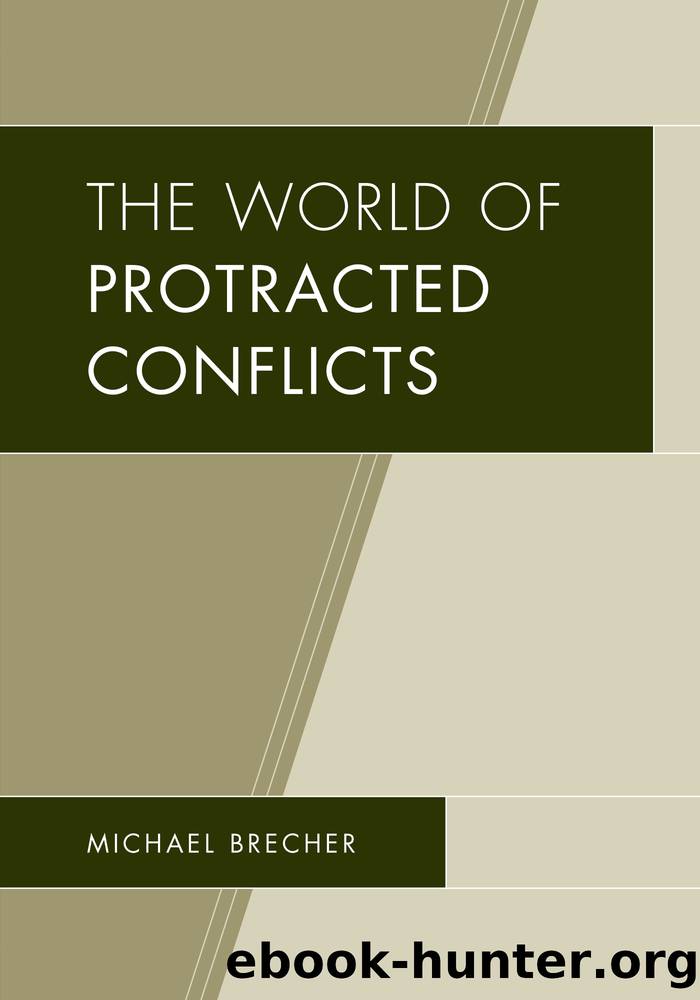The World of Protracted Conflicts by Brecher Michael;

Author:Brecher, Michael;
Language: eng
Format: epub
Tags: undefined
Publisher: Lexington Books
Published: 2012-08-15T00:00:00+00:00
Decision-Makers: DPRK and U.S.
Throughout the unresolved North Korean Nuclear PC the pre-eminent DPRK decision-maker on nuclear weapons issues, as on all matters of public policy, was the leader of the Kim family dynasty that ruled North Korea since its creation (along with the ROK, South Korea, by agreement between the U.S. and the USSR) in 1948. The founder of the DPRK, Kim Il Sung, ruled from 1948 until his death in 1994. His son, Kim Jong Il, held power from 1994 until his death in 2011. And Kim Jong-un succeeded his father, Kim Jong Il, on 29 December 2011. Although the opaque character of the North Korea political system precludes firm judgment about other DPRK decision-makers, it is reasonable to speculate that an advisory role was played by Kim-selected officials from the Korean Workers Party elite, the DPRK Military establishment, and the government bureaucracy. However, decisions on any substantive aspect of its controversial and significant nuclear weapons program were made by the Kim dynasty member who was then in power.
There were many more U.S. officials in a decision-making role on the North Korean nuclear weapons issue. The PresidentâClinton (1992â2000), Bush II (2000â2008), and Obama (since 2008)âwas, and remains, the ultimate decision-maker. However, no American president possessed decision-making power comparable to the three Kim family members in the DPRK. During the Clinton, Bush II, and Obama presidencies (1993â2013), there were many influential advisors to the President. Since they were all subordinate participants in U.S. decision-making, suffice it to note the official positions of these aides to the pre-eminent decision-maker, the Head of State and Government in the U.S. political system: Vice-President; Secretary of State; Secretary of Defense; National Security Advisor; Chairman of the Joint Chiefs of Staff (JCS); some senior Intelligence directors, notably those from the Central Intelligence Agency (CIA), Defense Intelligence Agency (DIA), and the Director of National Intelligence; Head of the U.S. Delegation to the spasmodic Six Party Talks; Assistant Secretary of State for East Asia, and the Commander-in-Chief, U.S.-Republic of Korea (ROK) Combined Forces Command.
Chapter 10
Download
This site does not store any files on its server. We only index and link to content provided by other sites. Please contact the content providers to delete copyright contents if any and email us, we'll remove relevant links or contents immediately.
| Comparative | Conflict of Laws |
| Customary | Gender & the Law |
| Judicial System | Jurisprudence |
| Natural Law | Non-US Legal Systems |
| Science & Technology |
American Kingpin by Nick Bilton(3887)
Future Crimes by Marc Goodman(3600)
The Meaning of the Library by unknow(2572)
Inside the Middle East by Avi Melamed(2357)
Why Nations Fail: The Origins of Power, Prosperity, and Poverty by Daron Acemoglu & James Robinson(2299)
On Tyranny by Timothy Snyder(2232)
Living Silence in Burma by Christina Fink(2072)
Putin's Labyrinth(2022)
The Mastermind by Evan Ratliff(1938)
The Smartest Kids in the World by Amanda Ripley(1856)
Think Like a Rocket Scientist by Ozan Varol(1822)
Law: A Very Short Introduction by Raymond Wacks(1748)
It's Our Turn to Eat by Michela Wrong(1731)
The Rule of Law by Bingham Tom(1698)
Philosophy of law a very short introduction by Raymond Wacks(1672)
Leadership by Doris Kearns Goodwin(1641)
A Dirty War by Anna Politkovskaya(1633)
Information and Communications Security by Jianying Zhou & Xiapu Luo & Qingni Shen & Zhen Xu(1622)
Civil Procedure (Aspen Casebooks) by Stephen C. Yeazell(1557)
